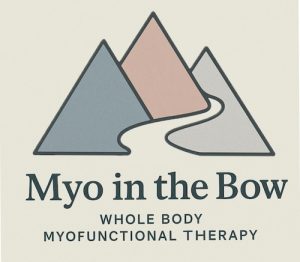What is Orofacial Myofunctional Therapy?
Orofacial Myofunctional Therapy (OMT) is a specialized approach that focuses on identifying and treating improper patterns of muscle function and oral habits involving the tongue, lips, jaw, and facial muscles. These patterns—often referred to as Orofacial Myofunctional Disorders (OMDs)—can impact breathing/ airway, speaking, chewing, swallowing, and even facial development over time.
Common signs of OMDs may include mouth breathing, tongue thrust during swallowing, low tongue posture at rest, and prolonged habits like thumb sucking or nail biting. These habits can stem from structural concerns, such as a tongue-tie (short lingual frenum), or from functional challenges like poor muscle coordination or airway restrictions.
Through a series of personalized exercises, myofunctional therapy helps retrain the muscles of the face and mouth to support healthy patterns of rest, movement, and function. Therapy can benefit people of all ages and often works best in collaboration with other healthcare providers for long-term, whole-body results.
Orofacial Myofunctional Disorders
Orofacial myofunctional disorders (OMDs) are problems caused by improper muscle function and habits that develop over time. These issues can be caused by things like a blocked airway, harmful oral habits, or physical conditions such as a tongue tie or a narrow palate.
Myofunctional therapy can help if you have any of these symptoms:
Myofunctional Therapy
A myofunctional therapy program will guide patients through exercises to retrain the muscles and help them perform their functions more efficiently. Therapy is commonly used for issues like:
Myofunctional Therapy is for everyone
Early intervention is key and habit elimination programs can begin as early as 3 years old; however, OMT can still be effective for children (ages 5+), teenagers, adults and even seniors!
What services are offered?
- Habit Elimination Programs (3+ year olds)
- Mini-Myo Therapy (therapy designed for children ages 5+)
- Pre/Post Frenectomy Therapy
- Jaw Stabilization Therapy
- Myofunctional Therapy (designed for young adults and adults)
CONTACT US
Ready to get started?
Reach out to us!
We would be more than happy to discuss treatment options
and start setting up appointments.
